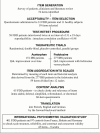Validation of a specific quality of life questionnaire for functional digestive disorders - PubMed (original) (raw)
Clinical Trial
Validation of a specific quality of life questionnaire for functional digestive disorders
O Chassany et al. Gut. 1999 Apr.
Abstract
Background: Dyspepsia and irritable bowel syndrome are suitable conditions for assessment of quality of life. Their similarities justify the elaboration of a single specific questionnaire for the two conditions.
Aims: To examine the process leading to the validation of the psychometric properties of the functional digestive disorders quality of life questionnaire (FDDQL).
Methods: Initially, the questionnaire was given to 154 patients, to assess its acceptability and reproducibility, analyse its content, and reduce the number of items. Its responsiveness was tested during two therapeutic trials which included 428 patients. The questionnaire has been translated into French, English, and German. The psychometric validation study was conducted in France, United Kingdom, and Germany by 187 practitioners. A total of 401 patients with dyspepsia or irritable bowel syndrome, defined by the Rome criteria, filled in the FDDQL and generic SF-36 questionnaires.
Results: The structure of the FDDQL scales was checked by factorial analysis. Its reliability was expressed by a Cronbach's alpha coefficient of 0.94. Assessment of its discriminant validity showed that the more severe the functional digestive disorders, the more impaired the quality of life (p<0.05). Concurrent validity was supported by the correlation found between the FDDQL and SF-36 questionnaire scales. The final version of the questionnaire contains 43 items belonging to eight domains.
Conclusions: The properties of the FDDQL questionnaire, available in French, English, and German, make it appropriate for use in clinical trials designed to evaluate its responsiveness to treatment among patients with dyspepsia and irritable bowel syndrome.
Figures
Figure 1
Stepwise procedure for the elaboration of the functional digestive disorders quality of life (FDDQL) questionnaire. FDD, functional digestive disorders; IBS, irritable bowel syndrome; QoL, quality of life.
Figure 2
Distribution among dyspeptic and irritable bowel syndrome patients of mean scores for the functional digestive disorders quality of life (FDDQL) questionnaire scales. Scores for each scale ranged from 0 (poor quality of life) to 100 (good quality of life). Differences between dyspeptic and irritable bowel syndrome patients were significant for the diet, discomfort, and stress scales (p<0.05, Mann-Whitney U test).
Figure 3
Distribution of mean scores for functional digestive disorders quality of life (FDDQL) questionnaire scales according to the number of symptoms. Each scale score and global score ranged from 0 (poor quality of life) to 100 (good quality of life). Intrascale differences were significant for all scales except those for coping with and control of disease and stress, according to the number of symptoms (p<0.05, Mann-Whitney U test). Differences between global scores, according to the number of symptoms were significant (p<0.001, Kruskal-Wallis test).
Figure 4
Distribution of mean scores for the SF-36 questionnaire among dyspeptic and irritable bowel syndrome patients versus controls. Scores for each scale ranged from 0 (poor quality of life) to 100 (good quality of life).
Comment in
- The quality of quality of life.
Irvine EJ. Irvine EJ. Gut. 1999 Apr;44(4):450-1. doi: 10.1136/gut.44.4.450. Gut. 1999. PMID: 10075945 Free PMC article. No abstract available.
Similar articles
- Quality of life in irritable bowel syndrome, effect of therapy.
Chassany O, Bergmann JF. Chassany O, et al. Eur J Surg Suppl. 1998;(583):81-6. doi: 10.1080/11024159850191300. Eur J Surg Suppl. 1998. PMID: 10027679 - Translation and psychometric evaluation of the Chinese version of functional digestive disorders quality of life questionnaire.
Feng-Bin L, Yong-Xing J, Yu-Hang W, Zheng-Kun H, Xin-Lin C. Feng-Bin L, et al. Dig Dis Sci. 2014 Feb;59(2):390-420. doi: 10.1007/s10620-013-2897-1. Epub 2013 Nov 8. Dig Dis Sci. 2014. PMID: 24202648 Free PMC article. - Assessment of functional gastrointestinal disorders using the Gastro-Questionnaire.
Leibbrand R, Cuntz U, Hiller W. Leibbrand R, et al. Int J Behav Med. 2002;9(2):155-72. doi: 10.1207/s15327558ijbm0902_06. Int J Behav Med. 2002. PMID: 12174533 - Quality of life measurement in gastroenterology: what is available?
Yacavone RF, Locke GR 3rd, Provenzale DT, Eisen GM. Yacavone RF, et al. Am J Gastroenterol. 2001 Feb;96(2):285-97. doi: 10.1111/j.1572-0241.2001.03509.x. Am J Gastroenterol. 2001. PMID: 11232666 Review. - The role of quality of life in functional gastrointestinal disorders: regulatory issues.
Bergmann JF, Chassany O. Bergmann JF, et al. Eur J Surg Suppl. 1998;(583):87-91. doi: 10.1080/11024159850191319. Eur J Surg Suppl. 1998. PMID: 10027680 Review.
Cited by
- High Rates of Non-Response Across Treatment Attempts in Chronic Irritable Bowel Syndrome: Results From a Follow-Up Study in Tertiary Care.
Dong Y, Baumeister D, Berens S, Eich W, Tesarz J. Dong Y, et al. Front Psychiatry. 2019 Oct 2;10:714. doi: 10.3389/fpsyt.2019.00714. eCollection 2019. Front Psychiatry. 2019. PMID: 31681031 Free PMC article. - Self-help guidebook improved quality of life for patients with irritable bowel syndrome.
Schneider A, Rosenberger S, Bobardt J, Bungartz-Catak J, Atmann O, Haller B, Kennedy A, Enck P. Schneider A, et al. PLoS One. 2017 Jul 25;12(7):e0181764. doi: 10.1371/journal.pone.0181764. eCollection 2017. PLoS One. 2017. PMID: 28742808 Free PMC article. - Acupuncture for irritable bowel syndrome: systematic review and meta-analysis.
Manheimer E, Wieland LS, Cheng K, Li SM, Shen X, Berman BM, Lao L. Manheimer E, et al. Am J Gastroenterol. 2012 Jun;107(6):835-47; quiz 848. doi: 10.1038/ajg.2012.66. Epub 2012 Apr 10. Am J Gastroenterol. 2012. PMID: 22488079 Free PMC article. - Zhizhu Kuanzhong Capsule in treating patients with functional dyspepsia postprandial distress syndrome: study protocol for a multicenter, randomized, double-blind, placebo-controlled, parallel-group clinical trial.
Xiao M, Zhong LLD, Lam WC, Zhao Y, Gwee KA, Holtmann G, Tack J, Suzuki H, Chen MH, Xiao Y, Hou X, Liu J, Li Y, Tang XD, Lu F. Xiao M, et al. Trials. 2022 Jun 2;23(1):454. doi: 10.1186/s13063-022-06396-5. Trials. 2022. PMID: 35655286 Free PMC article.
References
- Gastroenterology. 1988 Sep;95(3):701-8 - PubMed
- Aliment Pharmacol Ther. 1996 Feb;10(1):83-9 - PubMed
- Gastroenterology. 1989 Mar;96(3):804-10 - PubMed
- Med Care. 1989 Mar;27(3 Suppl):S217-32 - PubMed
- Control Clin Trials. 1990 Jun;11(3):169-79 - PubMed
Publication types
MeSH terms
LinkOut - more resources
Full Text Sources
Medical



